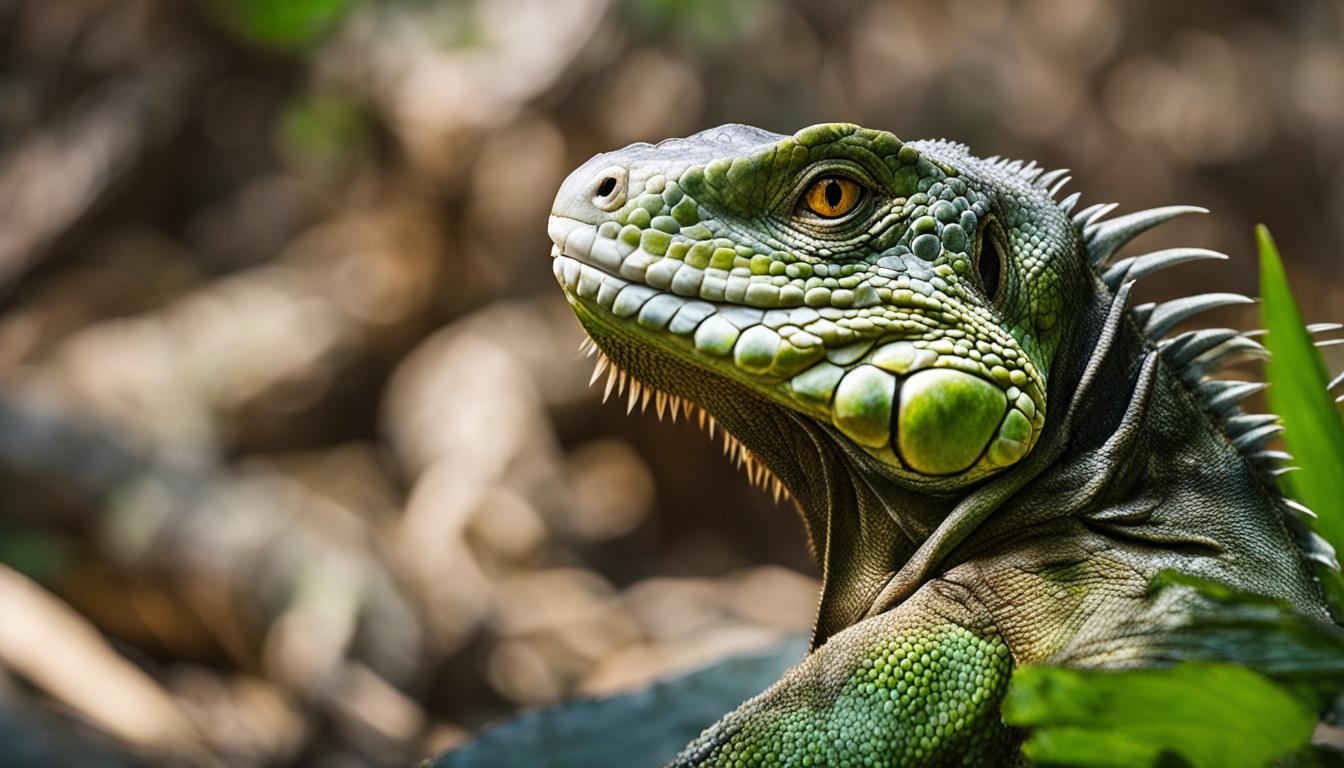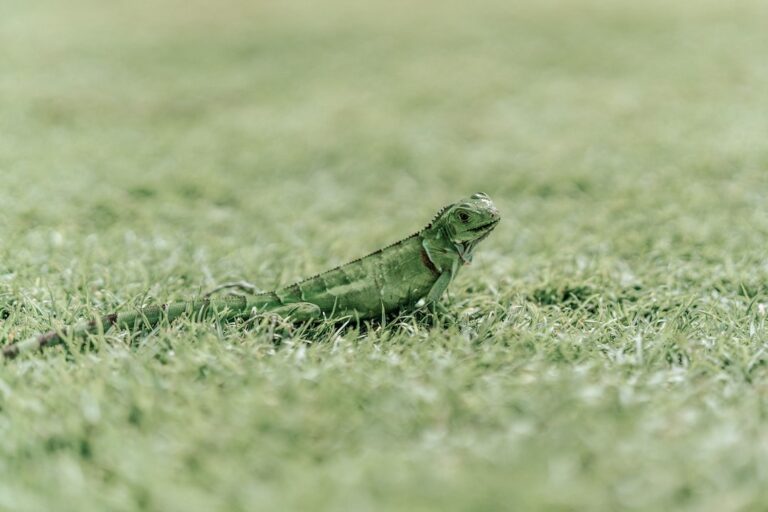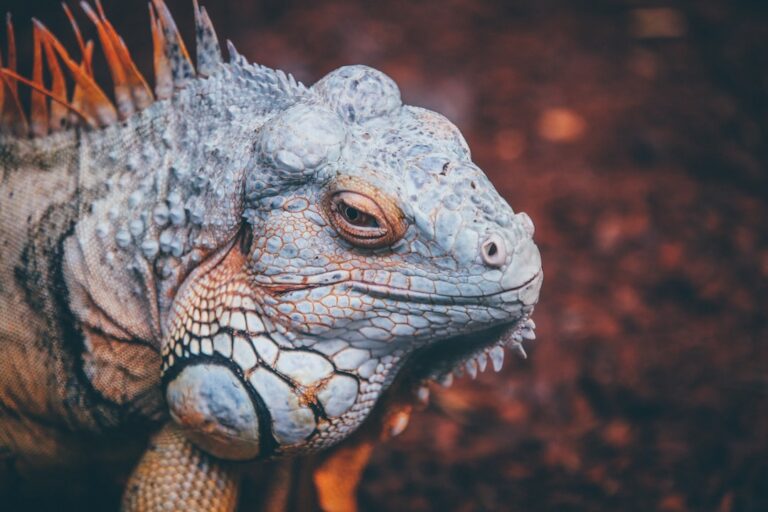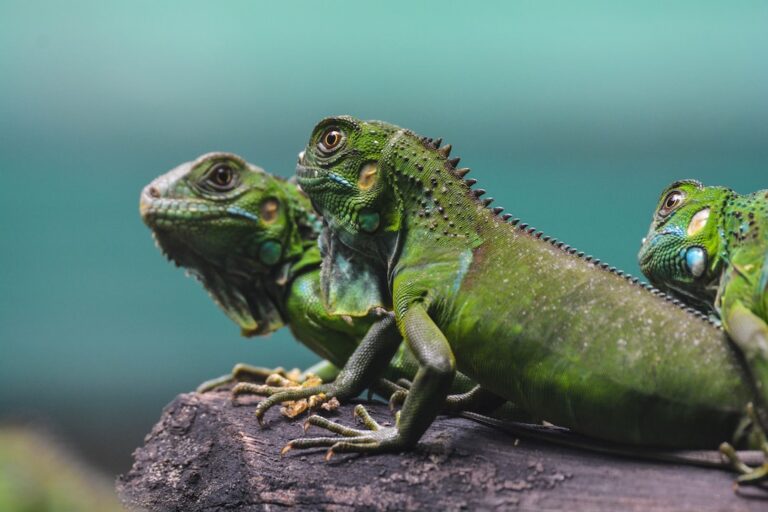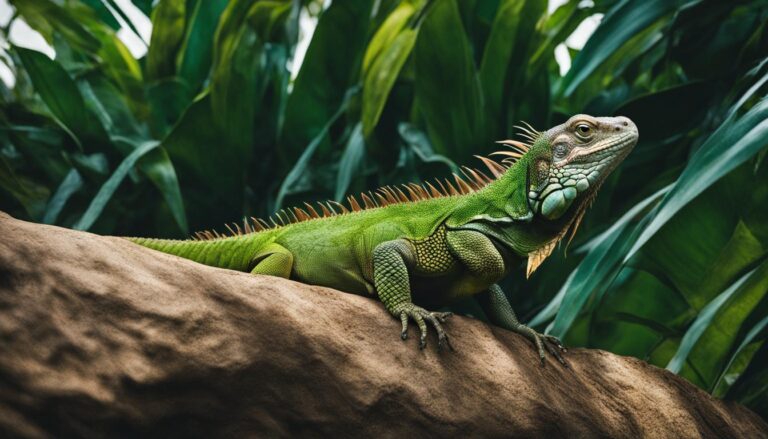Are Iguanas Dangerous?
Iguanas are fascinating reptiles that can be found in various parts of the world. Many people are curious about their behavior and whether or not they pose any danger. In this article, we will explore the topic of iguana safety and provide insights into their behavior, aggression, and potential risks. Whether you’re considering owning an iguana as a pet or simply want to learn more about these incredible creatures, read on to discover the truth about their danger level and how to live harmoniously with them.
While iguanas are generally not dangerous to humans, it is essential to understand their behavior and take necessary precautions. Their bites can cause injuries and puncture wounds due to their sharp teeth and powerful jaws. It is crucial to recognize signs of aggression and learn how to properly interact with these reptiles to minimize any potential risks.
Table of Contents
Key Takeaways:
- Despite being generally safe, iguanas can pose a risk due to their bites and aggressive behavior.
- Understanding iguana behavior and body language is crucial for avoiding potential dangers.
- Proper precautions and education can help ensure a harmonious coexistence with iguanas.
- Seeking professional help is necessary for iguana removal and control, especially when dealing with infestations.
- Emphasize humane removal methods to protect both the iguanas and the environment.
Understanding the Nature of Iguanas
Iguanas, belonging to the family Iguanidae, are fascinating reptiles known for their distinctive appearance and reptilian features. They come in various species, with the green iguana being the most common type. To better understand these reptiles, it is crucial to delve into their behaviors, characteristics, and the myths surrounding their interactions with humans.
The Basics of Iguana Species and Behaviors
There are different species of iguanas, each with its peculiarities and traits. The green iguana, scientifically known as Iguana iguana, is the most recognizable species, distinguished by its vibrant green coloration and impressive size. These reptiles are primarily herbivorous and prefer warm climates, making them prevalent in tropical regions.
| Iguana Species | Behavioral Traits |
|---|---|
| Green Iguanas (Iguana iguana) | Herbivorous; arboreal lifestyle; use body language for communication. |
| Rock Iguanas (Cyclura spp.) | Mostly herbivorous; terrestrial lifestyle; territorial behavior. |
| Fiji Banded Iguanas (Brachylophus spp.) | Herbivorous; arboreal lifestyle; males exhibit territorial displays. |
Iguanas have unique behaviors, such as basking in the sun to regulate their body temperature and employing body language for communication. Understanding the species-specific behaviors and their habitat requirements is vital for their welfare and for effectively interacting with them.
Dispelling Myths: Iguanas’ Typical Interaction with Humans
There are numerous myths and misconceptions surrounding the behavior of iguanas when it comes to their interaction with humans. It is important to debunk these myths and foster a better understanding of how iguanas typically behave in human encounters.
Myth: Iguanas are naturally aggressive towards humans.
Fact: Iguanas are generally not aggressive towards humans unless they feel threatened or cornered. Understanding their body language and respecting their personal space can help prevent adversarial situations.
Myth: Iguanas can transmit diseases to humans easily.
Fact: While iguanas can carry bacteria and parasites, the risk of disease transmission to humans is minimal if basic hygiene practices, such as handwashing, are followed after handling them.
Recognizing an Iguana’s Body Language
An essential aspect of safely interacting with iguanas is being able to interpret their body language, which can provide valuable insights into their emotional state and intentions. By understanding their body language cues, individuals can avoid potential risks and promote positive experiences with these reptiles.
Iguanas communicate through various visual signals, including body positioning, head bobbing, and color changes. For example, an agitated iguana may display a darkened coloration and erect its spines. Observing and respecting these cues can foster a harmonious coexistence between humans and iguanas.
Are Iguanas Dangerous?
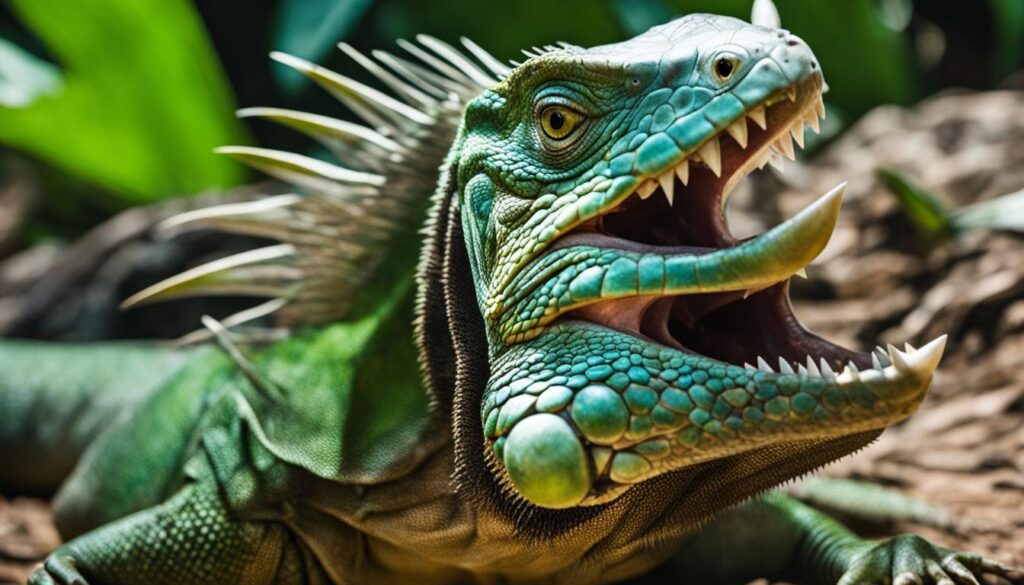
While iguanas are generally not dangerous, it is important to be aware of the potential risks they can pose in certain situations. One of the main concerns is their sharp teeth and powerful jaws, which can cause significant harm through bites, especially if provoked. It is essential to understand and assess these risks to ensure the safety of both humans and pets.
When it comes to human safety, it is crucial to exercise caution and avoid provoking iguanas. If an iguana feels threatened or cornered, it may become aggressive and resort to biting as a means of self-defense. This can result in painful injuries, puncture wounds, and potential infections. Therefore, it is essential to respect their space and maintain a safe distance.
Similarly, pet owners should be diligent in ensuring the safety of their furry companions when around iguanas. While iguanas are generally herbivorous, they may display aggressive behavior towards other animals, including dogs or cats. It is important to prevent direct interactions between pets and iguanas to avoid potential conflicts and injuries.
To mitigate the risks associated with iguanas, here are some precautionary measures:
- Do not approach or attempt to handle wild iguanas, as they are less predictable and may display defensive behaviors.
- Keep a safe distance from iguanas, especially if they are displaying signs of aggression such as hissing or head bobbing.
- Ensure your yard or garden is well-fenced to prevent iguanas from entering and potentially causing damage.
- Consult with local wildlife authorities or experts for guidance on managing iguana populations in your area.
- If you own a pet iguana, ensure proper training and socialization to minimize the risk of aggressive behavior.
By understanding the potential risks and taking necessary precautions, it is possible to coexist safely with iguanas and avoid any harmful incidents.
Assessing the Risk: Iguana Bites and Injuries
When interacting with iguanas, there is always a risk of bites and injuries. Iguanas have sharp teeth and powerful jaws that can inflict painful wounds. Understanding the anatomy of an iguana bite is crucial in assessing the severity of the injury and providing appropriate first aid and treatment.
The Anatomy of an Iguana Bite
An iguana bite can result in puncture wounds and lacerations due to the serrated edges of their teeth. Their bite force can be strong, especially when they feel threatened or provoked. It is important to recognize the potential risks associated with an iguana bite and respond accordingly.
First Aid and Treatment for Iguana Bites
If you or someone you know gets bitten by an iguana, immediate first aid should be administered. Here are some steps to follow:
- Wash the wound with clean water and mild soap to reduce the risk of infection.
- Apply gentle pressure to stop any bleeding, if present.
- Use an antiseptic solution or ointment to disinfect the wound.
- Cover the bite with a sterile bandage or dressing to protect it from dirt and further injury.
- Seek medical attention if the bite is deep, shows signs of infection, or if there are other complications.
It is essential to consult a healthcare professional for further evaluation and treatment, especially if there are concerns about infection or potential complications.
Potential for Infection: Understanding the Risks
One of the significant risks associated with iguana bites is the potential for infection. Iguanas may carry bacteria, such as Salmonella, in their mouths, which can be transmitted through bites. It is crucial to be aware of the infection risks and take necessary precautions to prevent complications.
To minimize the risk of infection from an iguana bite:
- Keep the wound clean and monitor it for any signs of infection, such as redness, swelling, or discharge.
- If there are concerns about infection, consult a healthcare professional for appropriate treatment, which may include antibiotics.
- Practice proper hygiene, such as washing hands thoroughly after handling iguanas or their belongings.
By understanding the anatomy of an iguana bite, providing prompt first aid, and being aware of the risks of infection, you can mitigate the potential complications associated with iguana bites. It is important to prioritize your safety and seek appropriate medical care when needed.
Iguanas in the Wild vs. Domesticated Iguanas
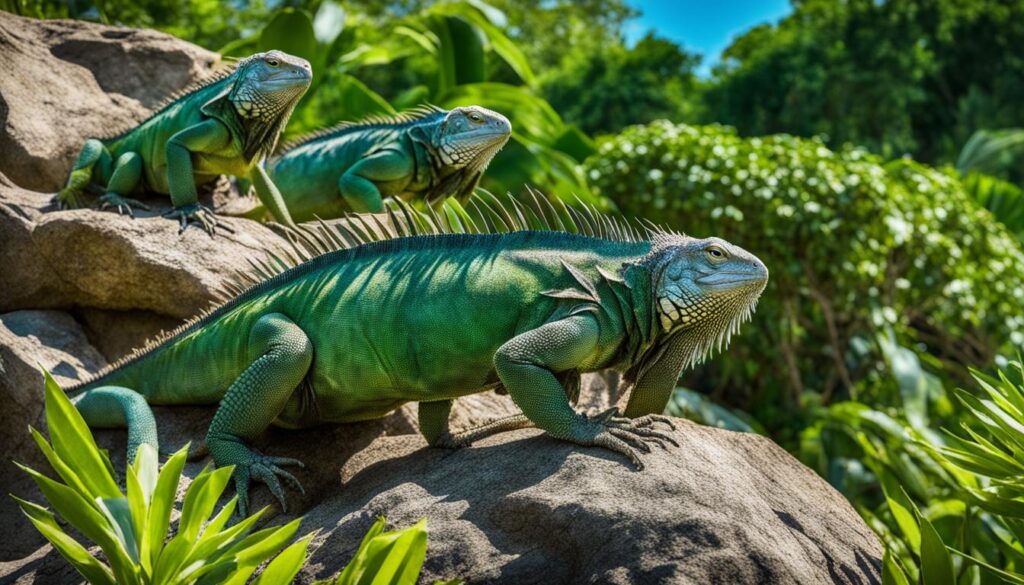
Understanding the behavior and potential dangers associated with iguanas requires differentiating between wild and domesticated specimens. Wild iguanas have distinct instincts and behaviors that set them apart from their domesticated counterparts. It is crucial to comprehend these differences in order to safely handle and care for a pet iguana and mitigate any risks associated with their behavior.
Wild iguanas are native to various regions around the world and have adapted to survive in their natural habitats. Their behavior is driven by their instincts and the need to secure resources for survival. They exhibit territorial behavior and may display aggression if they feel threatened. Wild iguanas rely on natural sources of food and may display different feeding patterns compared to their domesticated counterparts. It is important to respect their natural habitats and observe them from a safe distance to avoid any potential dangers.
Domesticated Iguanas:
Domesticated iguanas, on the other hand, have been raised in captivity and have undergone behavioral changes due to human interaction and selective breeding. They are more accustomed to human presence and may exhibit different behaviors compared to their wild counterparts. It is important to provide a suitable and enriching environment for pet iguanas, ensuring they have access to proper nutrition, lighting, and temperature requirements. This helps to promote their well-being and minimize any potential risks associated with their behavior.
“Understanding the differences between wild and domesticated iguanas is essential for ensuring the safety and welfare of these fascinating reptiles.”
| Wild Iguanas | Domesticated Iguanas | |
|---|---|---|
| Behavior | Driven by instincts and territoriality | Impacted by human interaction and selective breeding |
| Feeding Patterns | Rely on natural food sources | May have different dietary requirements |
| Habitat | Natural habitats in the wild | Captivity with specific environmental conditions |
| Interaction with Humans | May display aggression if threatened | Accustomed to human presence |
By understanding the distinctions between wild and domesticated iguanas, enthusiasts can provide appropriate care, minimize risks, and foster a harmonious relationship with these captivating creatures.
Iguanas and Their Impact on the Environment
Invasive species of iguanas can have a significant impact on the environment and local ecosystems. These iguanas, often introduced to new habitats through human activities, can disrupt the natural balance and biodiversity of their surroundings.
The Ecological Footprint of Invasive Iguana Species
When invasive iguanas establish themselves in a new environment, they can outcompete native species for resources such as food and shelter. This competition can lead to a decline in the population of native species, disrupting the delicate balance of the ecosystem.
In addition to competition with native species, invasive iguanas can also cause damage to vegetation. They have voracious appetites and can consume significant amounts of plant matter, affecting the growth and distribution of native plants. This can have cascading effects on other organisms that rely on these plants for food and habitat.
Protecting Your Garden and Property from Iguanas
Given the ecological impact of iguanas, it is essential to take measures to protect your garden and property from their presence. Here are some strategies to consider:
- Install physical barriers: Fences and barriers can be effective in preventing iguanas from entering your property. Ensure that the barriers are tall enough to discourage their climbing abilities.
- Remove food sources: Iguanas are attracted to sources of food, such as fruit trees and vegetable gardens. Harvest ripe fruits promptly and protect your garden with netting or fencing.
- Use deterrents: There are commercial reptile repellents available that can help deter iguanas from your property. These products usually contain natural ingredients that make the area less appealing to the iguanas.
- Consult professionals: If iguana infestation persists or if you require expert assistance, it is recommended to consult with professionals who specialize in iguana control and removal. They can provide effective strategies tailored to your specific situation.
By taking these steps, you can help minimize the impact of invasive iguanas on the environment and protect your garden and property from their feeding habits and burrows.
Professional Iguana Removal: Strategies and Legalities
When dealing with an iguana infestation or the need for removal, it is important to seek professional help. Professional iguana control services offer specialized expertise and knowledge to effectively and safely handle the situation. Their experience allows them to implement strategies that are tailored to the specific needs of each situation, ensuring the successful removal of iguanas from the property.
One of the key aspects to consider when hiring professional iguana control services is the legal framework surrounding iguana removal. In many areas, there are regulations and restrictions in place to protect wildlife and ensure their humane treatment. It is crucial to work with professionals who are well-versed in these legal aspects and abide by the guidelines set forth.
Humane iguana removal is an important consideration in the process. Professionals employ methods that prioritize the welfare of the animals while effectively resolving the issue. This involves using humane trapping techniques, carefully relocating the iguanas to suitable habitats, and implementing preventive measures to avoid future infestations.
By enlisting the services of professional iguana control specialists, property owners can ensure the effective and ethical removal of iguanas. These professionals have the knowledge, experience, and resources to handle the process efficiently while adhering to legal obligations and prioritizing the welfare of the iguanas.
Conclusion
In conclusion, it’s important to understand that iguanas are not inherently dangerous creatures. However, they can pose risks in certain situations, especially if their behavior is not properly understood or if they feel threatened.
To ensure safety when coexisting with iguanas, it’s crucial to be aware of their nature and take necessary precautions. Some best practices to consider include:
- Give iguanas their space and avoid provoking them. Remember, they are wild animals and may become aggressive if they feel threatened.
- Avoid feeding iguanas. Feeding them can encourage them to linger around human habitats, increasing the chances of conflicts or possible injuries.
- Secure your property and garden. Iguanas may be attracted to certain plants or vegetables, so take measures to protect them. Additionally, make sure your property is properly fenced to prevent iguanas from entering.
- Seek professional help when needed. If you’re facing an iguana infestation or need assistance with their removal, it’s best to consult with a professional iguana control service. They can provide effective strategies for removal while adhering to legal regulations and ensuring human and iguana safety.
By following these guidelines and taking the necessary precautions, it is possible to live harmoniously with iguanas and minimize any potential dangers. Always remember to prioritize your safety and the well-being of these fascinating reptiles.
FAQ
Are iguanas dangerous?
Iguanas are generally not dangerous, but there are risks associated with them, such as iguana bites and injuries. It is important to understand their behavior and take necessary precautions to safely coexist with them.
What are the basics of iguana species and behaviors?
Iguanas belong to the family Iguanidae and have different species. Green iguanas are the most common. They have specific behaviors and characteristics, such as their diet, habitat preferences, and mating patterns, that are important to understand.
Do iguanas interact with humans in a typical way?
Yes, iguanas generally interact with humans in a docile manner. It is a myth that iguanas are dangerous or aggressive towards humans unless provoked. Understanding their behavior can help dispel misconceptions.
How can I recognize an iguana’s body language?
Recognizing an iguana’s body language is essential to avoid potential risks. They may display signs of stress or feel threatened. Learning to identify these signs can help prevent any dangerous situations.
What are the potential risks of iguana bites?
Iguana bites can cause injuries and puncture wounds due to their serrated teeth. It is important to understand the anatomy of an iguana bite, provide proper first aid, and be aware of the potential risks, including infection.
How do wild iguanas differ from domesticated ones?
Wild iguanas have different instincts and behaviors compared to domesticated ones. It is important to understand the differences and know how to safely handle and care for a pet iguana to prevent any risks associated with their behavior.
What is the ecological impact of invasive iguana species?
Invasive iguana species can have a significant impact on the environment and local ecosystems. Understanding their ecological footprint and taking steps to control their population can help protect the natural balance.
How can I protect my garden and property from iguanas?
To protect your garden and property from iguanas, you can employ various strategies such as installing barriers and deterrents. It is important to prevent damage caused by their feeding habits and burrows.
What are the strategies and legalities of professional iguana removal?
Professional iguana control services can provide effective strategies for removal and ensure compliance with legal regulations regarding iguana removal. Prioritizing humane removal methods minimizes harm to the iguanas and the environment.
What are the dangers associated with iguanas, and how can I coexist with them?
While iguanas are generally not dangerous, it is important to be aware of their behavior and take necessary precautions to ensure safety. By understanding their nature, following best practices, and seeking professional help when needed, it is possible to coexist harmoniously with iguanas.

